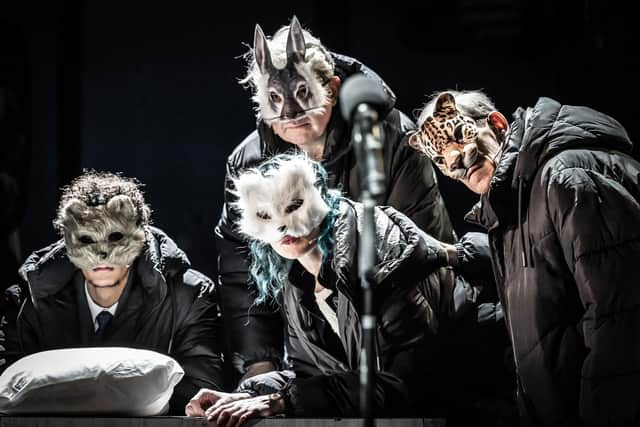Review: Drive Your Plow Over the Bones of the Dead at the Belgrade Theatre, Coventry


An extraordinary book, presented on stage by an extraordinary theatre company, featuring one of our most extraordinary actors: this was always going to be extraordinary.
But what is perhaps most extraordinary about the wild and disorientating Drive Your Plow Over the Bones of the Dead is that it may take even itself by surprise. It may not be the thing it thinks it is. Whether that constitutes artistic failure or success is one of the many questions it raises, albeit far from the most important.
Advertisement
Hide AdAdvertisement
Hide AdThe production is based on a novel by Olga Tokarczuk; it won her the Nobel Prize for Literature in 2018. It is narrated by an ageing lady named Janina Duszejko, who tells of strange people, strange animals, a strange life and strange deaths. Coursing through it is the poetry of William Blake, from whose work its title derives; fittingly, the production conjures a world of infinite fantastical possibility, while retaining an earthy naturalism.


Janina is played by Kathryn Hunter. Her voice alone evokes the deepest soil and the deepest time, while her sinewy body makes for the most potent of props. She recounts the story directly to the audience, mostly from the front of the stage. She is the one fixed point: surrounding her is an ensemble of the most mercurial nature, melting into countless characters. The staging itself is minimal: there are stark lights and there are projections, sometimes straightforward and sometimes oblique, and there are costumes, whose every thread seems full of purpose. The production is a remarkable feat both of imagination and logistics, but it is also a masterclass in simplicity, the theatrical potential of every element exploited to its utmost. Dissertations could be written about its use of house lights alone.
The story seems to be about nature, which, so long wronged by humankind, takes a curious kind of revenge. Along the way, mystery is piled upon mystery, and mystery is found within mystery, from the movements of the planets to the lives of the plants. Until suddenly, there is clarity. And this is perhaps where matters become strangest of all, because the clarity we are supposed to be seeing may not be the clarity we experience. The programme notes by the director, Simon McBurney, are unambiguous: the play is supposed to awaken in us a sense of fury at our treatment of what we call the natural world, and Janina is supposed to be a kind of prophet, calling us to repentance or even revolution. But the way it is presented on stage leaves room for an entirely different interpretation: that it is a warning of the terrible dangers of misanthropy. It seems this is the only way to explain its baffling shortcomings: the crudely stereotypical portrayals of certain characters make sense only if we are seeing them through the eyes of one who is deeply ungenerous towards humanity. The play purports to abhor human exceptionalism, but ends up reinforcing it.
It is graphic and disturbing; it is also funny. As a theatrical experience, little else this year will come close. But as Blake might say: thou readst black where I read white.
Until April 22. Tickets: belgrade.co.uk